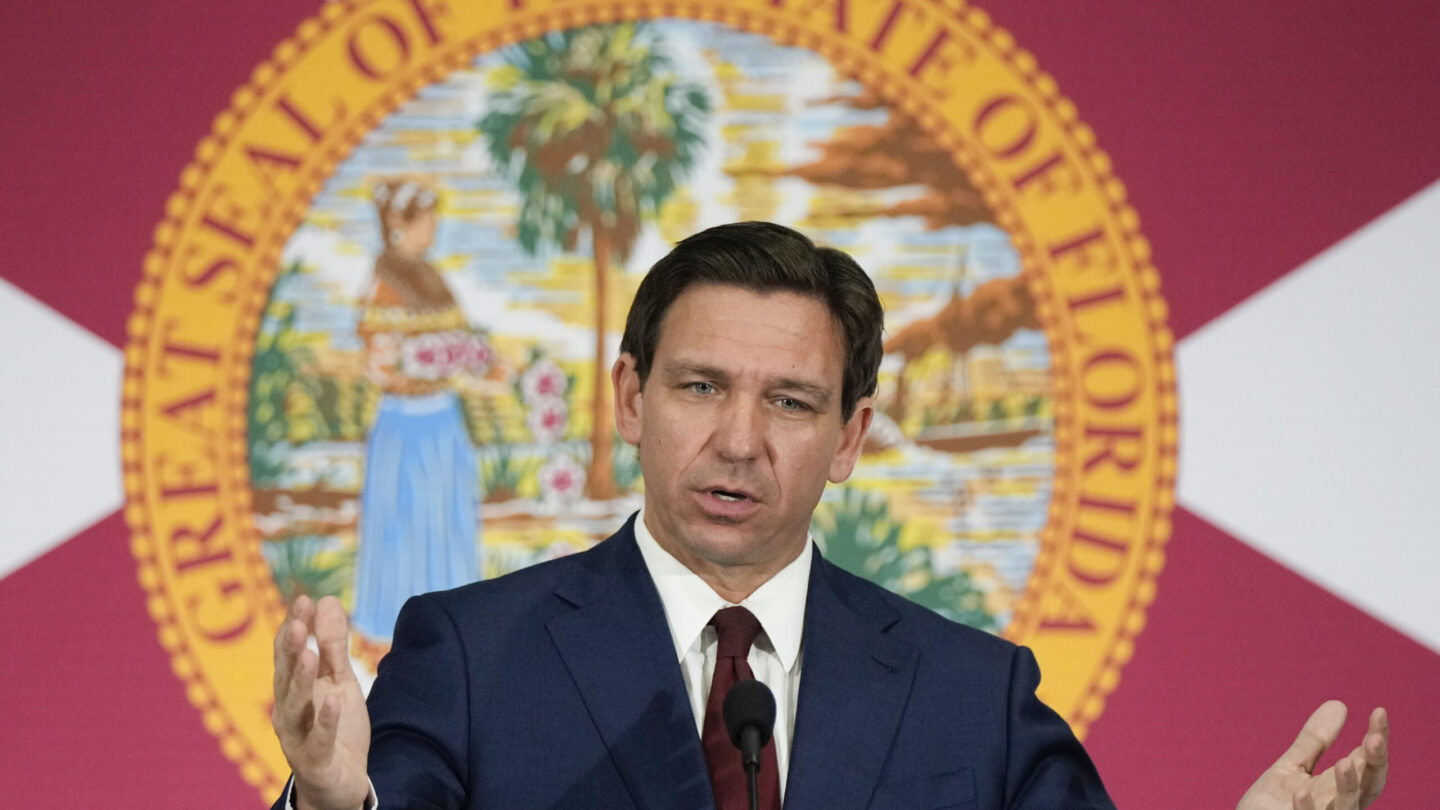Republican presidential candidate Ron DeSantis promised to end birthright citizenship, finish building the southern border wall and send U.S. forces into Mexico to combat drug cartels as part of an aggressive — and familiar — immigration policy proposal he laid out Monday in a Texas border city.
The sweeping immigration plan, the Florida governor’s first detailed policy release as a 2024 contender, represents a long-established wish list of Republican immigration proposals that largely mirrors former President Donald Trump’s policies. Much of DeSantis’ plan faces tall odds, requiring the reversal of legal precedents, approval from other countries or even an amendment to the U.S. Constitution.
Still, DeSantis projected confidence on Monday, slapping at leaders in both political parties as he detailed his plan while facing a small crowd in Eagle Pass, Texas, a community that has emerged as a major corridor for illegal border crossings during Joe Biden’s presidency.
“I have listened to people in D.C. for years and years and years, going back decades — Republicans and Democrats — always chirping about this yet never actually bringing the issue to a conclusion,” DeSantis told an audience of roughly 100 people. “What we’re saying is no excuses on this.”
The DeSantis campaign has promised to release more detailed policy rollouts in the coming weeks. But in leading with immigration, DeSantis is prioritizing a divisive issue that has long been a focus of the GOP’s most conservative voters. At the same time, voters in the middle and on the left have taken notice as illegal border crossing surged in recent years.
Overall, 6 in 10 adults in the U.S. disapprove of President Joe Biden’s handling of immigration, according to a recent AP-NORC poll.
Still, it may be difficult for DeSantis to separate himself on immigration from the many other Republicans seeking the 2024 presidential nomination — especially Trump, who’s the front-runner.
The former president apparently watched his Republican rival’s appearance on television. He described DeSantis’ remarks as “very boring.”
“The DeSanctus speech was just a rehash of all the things I did to have the ‘safest and strongest Border in U.S. history,’” Trump wrote on social media.
Trump emphasized immigration while delivering the keynote address to hundreds of enthusiastic religious conservatives at the Faith and Freedom Coalition’s conference in Washington over the weekend. He promised to carry out “the largest domestic deportation operation on the border” and boasted about completing more than 300 miles (or 480 kilometers) of wall along the southern border during his administration while promising to build even more should he win another term.
The former president also vowed to reinstate coronavirus pandemic-era rules known as Title 42 that allowed U.S. authorities to quickly turn back migrants at the border, decrying without evidence “all of the diseases that illegal aliens are bringing in.”
DeSantis did not mention Trump by name when unveiling his new policies, but his repeated references to the unfinished border wall were nonetheless a knock on the former president. Trump tried and ultimately failed to finish a border wall along the entire 1,950-mile (3,140-kilometer) U.S.-Mexico border during his four years in office.
Before the Monday announcement, the DeSantis campaign released new merchandise bearing the words, “Build The Wall. No Excuses.”
Trump’s policies worked to constrict immigration, but the number of people crossing the U.S.-Mexico border still swelled during his time in office before dropping during the COVID-19 pandemic.
And his policies caused clogs in the system that led to massive overcrowding; the immigration court case backlog alone grew from roughly 500,000 in June 2016 to 1.3 million cases by the end of 2020. There were massive human rights concerns, too, particularly with the Remain in Mexico program and the separation of children from their families at the border.
In his plan, DeSantis is embracing many of the same policies.
DeSantis promises to end the United States’ so-called catch-and-release policy, which currently allows for the release of immigrants in the country illegally until their court dates. That’s as federal immigration authorities have the money for just 30,000 beds, making it impossible to detain everyone who is arrested.
DeSantis also wants to reinstitute the Remain in Mexico policy to make asylum-seekers wait in Mexico for hearings in U.S. immigration court. Such a plan would need Mexico’s approval.
He’s calling for closing the “Flores loophole,” which, among other things, requires families to generally be released from custody in 20 days. It is part of a federal court order, so it’s unclear how he could close it if elected.
DeSantis is also promising to use military force against drug cartels if necessary. He would also “reserve the right to operate across the border to secure our territory from Mexican cartel activities,” according to the plan, which also calls for the U.S. Navy and the Coast Guard to block precursor chemicals from entering Mexican ports if “the Mexican government won’t stop cartel drug manufacturing.”
“We will use every bit of leverage at our disposal against both Mexico and every power at our disposal against the cartels,” he told his audience in Eagle Pass. “If they are trying to move product into this country and they are killing our people, you don’t only have the right, you have a responsibility to fight back.”
DeSantis’ plan says little about the millions of immigrants already living in the country illegally, aside from promising to deport those who have overstayed their visas. Deporting such people has been a challenge that has eluded authorities for decades.
The Florida governor spoke publicly about key elements of his plan for the first time in Eagle Pass, an area where surrounding farms and sparsely populated towns topped Texas’ Rio Grande Valley in arrests during parts of last year.
Groups of dozens, sometimes hundreds of people, waded through the river’s shallow water to surrender to Border Patrol agents in the sprawling town of warehouses and decaying houses. Mission: Border Hope, a migrant aid group, moved to a large warehouse last year to help arrange bus travel to San Antonio for up to 1,000 people a day who were released with orders to report to immigration court or an immigration office.
In September, the small border city made international headlines when nine people drowned in their attempt to swim through the Rio Grande.
While the area leans Democratic, some in the audience on Monday spoke of new conservative momentum. One teacher in the audience noted that local schools are forced to lock down at times when law enforcement chases immigrants attempting to evade detection. Several mothers in the crowd also said they have lost children to fentanyl overdoses.
DeSantis was supportive of one audience member who suggested that the “invasion” at the border constituted an “act of war.”
“I think the state of Texas has the right to declare an invasion,” DeSantis told the man. “You’re going to see as president under Article 2 of the Constitution, you have a responsibility and a duty to protect the country. We are going to do that and we are going to do that robustly.”









